Dr Dan Franklin, Associate Professor in Environmental Science, and Annesia Lamb, Post-Doctoral Research Assistant/Senior Research Associate, write about RaNTrans, an Interreg project addressing the issues of excess nutrients in coastal waters…
The Interreg (Rapid Reduction of Nutrients in Transitional Waters) project is a partnership of several UK and French organisations addressing the issues of excess nutrients (particularly nitrogen) in coastal waters. Human modification of the nitrogen cycle is recognised as one of the “planetary boundaries” beyond which humanity currently operates. Excess nitrogen in coastal ecosystems can cause dramatic ecological changes and significantly alter how ecosystems function.
RaNTrans has had a strong focus on the use of seaweeds and oysters to mitigate excess nitrogen conditions. Seaweeds and oysters take up and store nutrients in their tissues and when harvested can act as a removal mechanism to offset human nutrient discharges from agriculture and wastewater treatment works. They are also the subject of large-scale ecosystem restoration projects through European coastal waters.
Green seaweeds (such as Ulva) are often very abundant in high-nutrient estuaries. They can form “mats” and shade other species of seaweeds, potentially change dissolved oxygen conditions, and can also change the amount of food available to wading birds in the underlying sediments. Improving our understanding of mat species and biochemical composition, mat dynamics and computer modelling, and mat detection with remote sensing are other aspects of the project.
This year RaNTrans successfully completed a large-scale seaweed collection trial in Holes Bay, Poole Harbour, which removed several hundred kilos of seaweed mat. This effort involved up to 10 project personnel working at our Hole’s Bay experimental site.
We are now monitoring the impact of this collection effort on bird ecology, sediment macrofauna (the clams, worms etc that live in the mud) and we are quantifying how fast the seaweed mat returns to the harvested plots. We have found that the growth conditions for green mat-forming species of seaweeds in Holes Bay are especially benign, resulting in an almost single-species mat which is relatively straightforward to harvest.
The project runs until June 2023 and we hope that our findings will lead to a better understanding, and greater innovation, in how we manage an environmental issue that is significant throughout the coastal waters of the world.
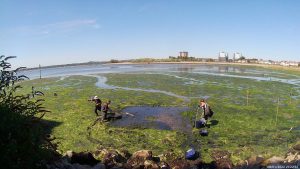
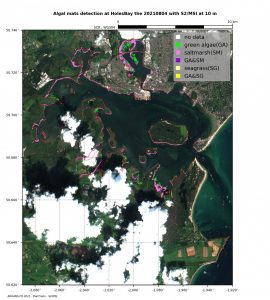
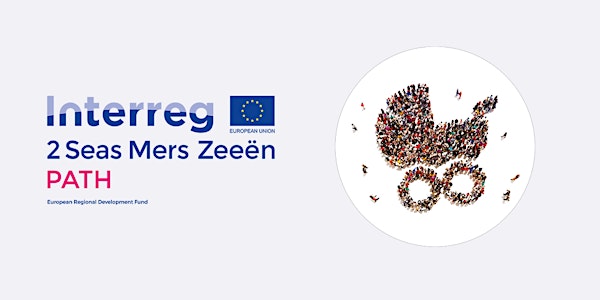
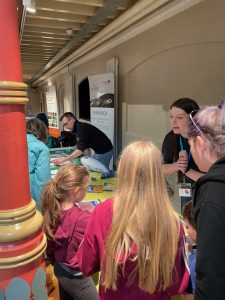
 Interreg has been one of the funding sources where BU academics have been successful during previous years. RDS have had a number of enquiries from academics regarding our eligibility to apply for Interreg funding after the UK has left the EU. The answer may be both – yes and no.
Interreg has been one of the funding sources where BU academics have been successful during previous years. RDS have had a number of enquiries from academics regarding our eligibility to apply for Interreg funding after the UK has left the EU. The answer may be both – yes and no. The next EU budget period is designed for 2021-2027; if Interreg calls for proposals are to be funded from the EU 2021-2027 budget, UK participants will not be eligible for EU funding.
The next EU budget period is designed for 2021-2027; if Interreg calls for proposals are to be funded from the EU 2021-2027 budget, UK participants will not be eligible for EU funding. INTERREG Channel programme has pre-announced an event on flooding to be held on 10 July, 2019 in London.
INTERREG Channel programme has pre-announced an event on flooding to be held on 10 July, 2019 in London.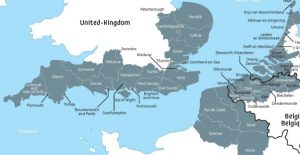 Some projects are looking for UK Partners in following areas:
Some projects are looking for UK Partners in following areas: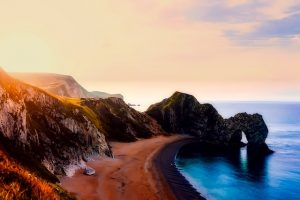 Other changes include new pages for both Micro-Projects and Regular Projects, with the application processes now clearly laid out in a step-by-step guide. Layout of the Programme’s specific objectives also has been improved and created a dedicated page for new Targeted Projects initiative.
Other changes include new pages for both Micro-Projects and Regular Projects, with the application processes now clearly laid out in a step-by-step guide. Layout of the Programme’s specific objectives also has been improved and created a dedicated page for new Targeted Projects initiative.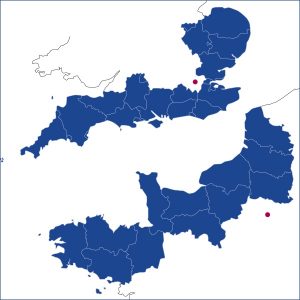
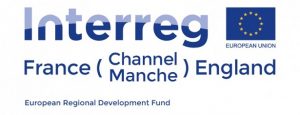


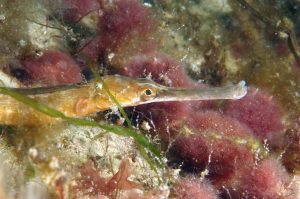
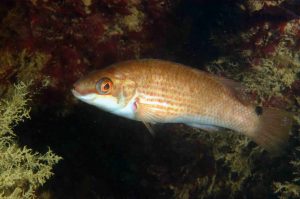


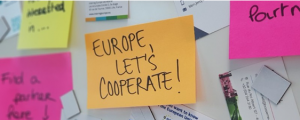
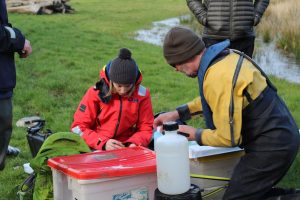 On Tuesday 6th February, Bournemouth University Research Associate Katie Thompson from the Department of Life and Environmental Sciences (SciTech) joined the SAMARCH (Salmonid Management round the Channel) team in search of sea trout in the river Frome. The five year EU Interreg Channel Programme funded project (2017-2022) will track juvenile salmon and juvenile and adult sea trout through four English and French estuaries to fill the gaps in our knowledge of how quickly fish migrate through intertidal habitat, their migration pathways and where adult sea trout spend time at sea. Currently, 95% of our salmon and sea trout die at sea, compared to only 75% in the 1970s. The project aims to answer the question of what proportion of this mortality occurs in estuaries and coastal waters compared to the open sea by using small acoustic and data storage tags. The project includes 10 partners from France and England who are a blend of research and regulatory organisations, and key stakeholders (Bournemouth University, Game and Wildlife Conservation Trust, University of Exeter, INRA Science & Impact, Environment Agency, Salmon and Trout Conservation, Agro Campus, Agence française pour la biodiversité, Normandie grands migrateurs, Obersvatoire des poissons migrateurs Bretagne).
On Tuesday 6th February, Bournemouth University Research Associate Katie Thompson from the Department of Life and Environmental Sciences (SciTech) joined the SAMARCH (Salmonid Management round the Channel) team in search of sea trout in the river Frome. The five year EU Interreg Channel Programme funded project (2017-2022) will track juvenile salmon and juvenile and adult sea trout through four English and French estuaries to fill the gaps in our knowledge of how quickly fish migrate through intertidal habitat, their migration pathways and where adult sea trout spend time at sea. Currently, 95% of our salmon and sea trout die at sea, compared to only 75% in the 1970s. The project aims to answer the question of what proportion of this mortality occurs in estuaries and coastal waters compared to the open sea by using small acoustic and data storage tags. The project includes 10 partners from France and England who are a blend of research and regulatory organisations, and key stakeholders (Bournemouth University, Game and Wildlife Conservation Trust, University of Exeter, INRA Science & Impact, Environment Agency, Salmon and Trout Conservation, Agro Campus, Agence française pour la biodiversité, Normandie grands migrateurs, Obersvatoire des poissons migrateurs Bretagne).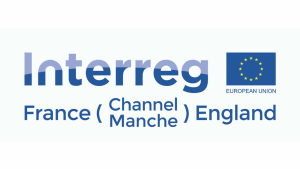

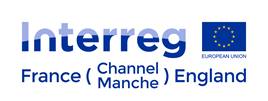












 Expand Your Impact: Collaboration and Networking Workshops for Researchers
Expand Your Impact: Collaboration and Networking Workshops for Researchers Visiting Prof. Sujan Marahatta presenting at BU
Visiting Prof. Sujan Marahatta presenting at BU 3C Event: Research Culture, Community & Can you Guess Who? Thursday 26 March 1-2pm
3C Event: Research Culture, Community & Can you Guess Who? Thursday 26 March 1-2pm UKCGE Recognised Research Supervision Programme: Deadline Approaching
UKCGE Recognised Research Supervision Programme: Deadline Approaching ECR Funding Open Call: Research Culture & Community Grant – Apply now
ECR Funding Open Call: Research Culture & Community Grant – Apply now ECR Funding Open Call: Research Culture & Community Grant – Application Deadline Friday 12 December
ECR Funding Open Call: Research Culture & Community Grant – Application Deadline Friday 12 December MSCA Postdoctoral Fellowships 2025 Call
MSCA Postdoctoral Fellowships 2025 Call ERC Advanced Grant 2025 Webinar
ERC Advanced Grant 2025 Webinar Update on UKRO services
Update on UKRO services European research project exploring use of ‘virtual twins’ to better manage metabolic associated fatty liver disease
European research project exploring use of ‘virtual twins’ to better manage metabolic associated fatty liver disease